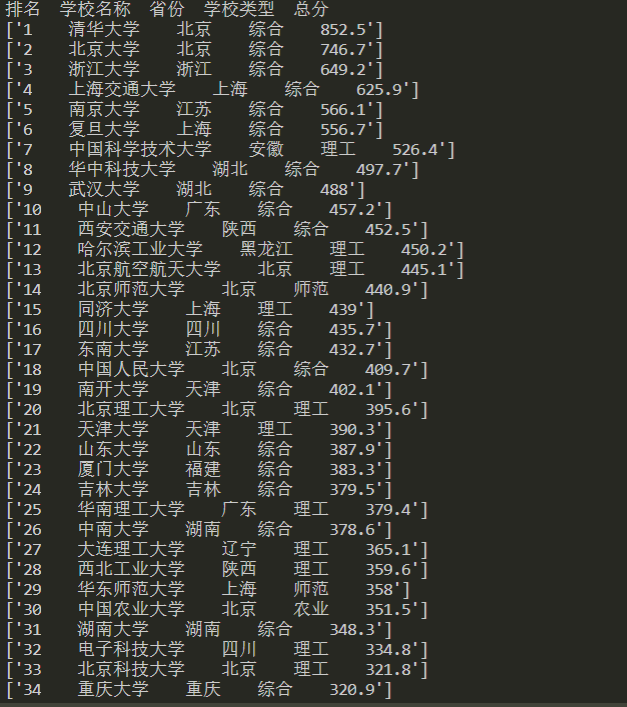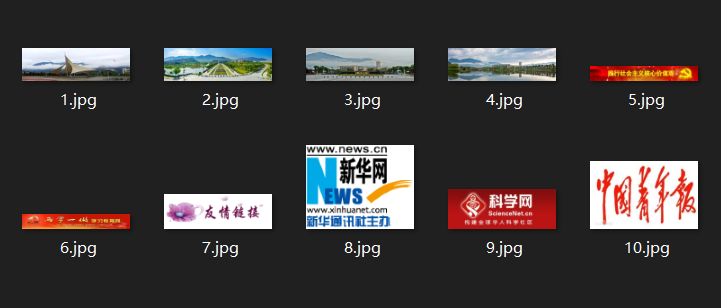2020数据采集与融合技术第一次作业
数据采集与融合技术第一次作业
第一题
题目
要求:用requests和BeautifulSoup库方法定向爬取给定网址的数据,屏幕打印爬取的大学排名信息。
解答
主要就是BS的基本使用
code:
import requests,bs4
url = "http://www.shanghairanking.cn/rankings/bcur/2020"
soup = bs4.BeautifulSoup(requests.get(url).content.decode(),"html.parser")
information = []
for child in soup.find("tbody").children:
res = child.find_all("td")
information.append([res[0].text.strip() + " " + res[1].text.strip() + " " + res[2].text.strip() + " " +
res[3].text.strip() + " " + res[4].text.strip()])
print("排名 学校名称 省份 学校类型 总分")
for info in information:
print(info)
result

第二题
题目
要求:用requests和re库方法设计某个商城(自已选择)商品比价定向爬虫,爬取该商城,以关键词“书包”搜索页面的数据,爬取商品名称和价格。
解答
选择京东商城,爬书包太没劲了,故选择关键词为“RTX3080”。
code
## 并不完善的一份代码,暂时不支持中文搜索
from urllib.request import urlopen
from bs4 import BeautifulSoup
import re
print("please input:")
item = input()
url = 'https://search.jd.com/Search?keyword='+item ##这玩意好像每天都在变
html = urlopen(url)
bs = BeautifulSoup(html,'html.parser')
goods = bs.find_all("li",{"data-sku":re.compile("\d+")})
for good in goods:
# print(good.get_text())
# print(good)
good_info = good.find("div",{"class":"p-name p-name-type-2"}).find('em').get_text()
# print(good_info)
price = good.find('div',{'class':'p-price'}).strong.i.get_text()
print(good_info.replace("\n","").replace("\t",""),price,"¥")
result

第三题
题目
要求:爬取一个给定网页或者自选网页的所有JPG格式文件。
解答
查看具体网址的源代码后发现,主要的图片都在content内部,故使用BeautifulSoup4中的find_all函数在content内搜索图片路径。
图片路径包括内链接(以“/...”开头,是给定网站内部的图片)与外链接(以“HTTP...”开头,是其他网站的图片),故对两种图片链接分类处理。
得到所有图片的链接后,使用requests.get()获取图片数据。
code
from urllib.request import urlopen
from bs4 import BeautifulSoup
# from urllib import urlretrieve
import requests
url = 'http://xcb.fzu.edu.cn/'
html = urlopen(url)
bs = BeautifulSoup(html,'html.parser')
name = 1
for imgs in bs.find('div',{'class':'content'}).find_all('img'):
# if 'src' in imgs.attrs:
# print(imgs)
img = imgs['src']
if img[-3:] != 'gif':
if img[:4] == 'http':
path = img
else:
path = url+img
else:
continue
print(path)
# img_data = urlopen(path)
# img_data = img_data.read()
img_file = requests.get(path).content
with open("Object1:爬取学生信息\images/"+str(name)+".jpg","wb") as f:
f.write(img_file)
f.close()
print(name,"over")
name += 1
result




